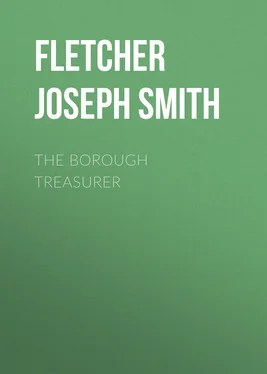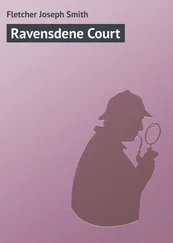Joseph Fletcher - The Borough Treasurer
Здесь есть возможность читать онлайн «Joseph Fletcher - The Borough Treasurer» — ознакомительный отрывок электронной книги совершенно бесплатно, а после прочтения отрывка купить полную версию. В некоторых случаях можно слушать аудио, скачать через торрент в формате fb2 и присутствует краткое содержание. Жанр: foreign_prose, Классический детектив, foreign_detective, foreign_antique, на английском языке. Описание произведения, (предисловие) а так же отзывы посетителей доступны на портале библиотеки ЛибКат.
- Название:The Borough Treasurer
- Автор:
- Жанр:
- Год:неизвестен
- ISBN:нет данных
- Рейтинг книги:5 / 5. Голосов: 1
-
Избранное:Добавить в избранное
- Отзывы:
-
Ваша оценка:
- 100
- 1
- 2
- 3
- 4
- 5
The Borough Treasurer: краткое содержание, описание и аннотация
Предлагаем к чтению аннотацию, описание, краткое содержание или предисловие (зависит от того, что написал сам автор книги «The Borough Treasurer»). Если вы не нашли необходимую информацию о книге — напишите в комментариях, мы постараемся отыскать её.
The Borough Treasurer — читать онлайн ознакомительный отрывок
Ниже представлен текст книги, разбитый по страницам. Система сохранения места последней прочитанной страницы, позволяет с удобством читать онлайн бесплатно книгу «The Borough Treasurer», без необходимости каждый раз заново искать на чём Вы остановились. Поставьте закладку, и сможете в любой момент перейти на страницу, на которой закончили чтение.
Интервал:
Закладка:
They were all three walking towards the town by that time, and Bent slipped between Brereton and Mallalieu and took the Mayor's arm.
"Murder's happened," he said. "That's the plain truth of it. You know old Kitely—your partner's tenant? Well, somebody's killed him."
The effect of this announcement on Mallalieu was extraordinary. Bent felt the arm into which he had just slipped his own literally quiver with a spasmodic response to the astonished brain; the pipe which Mallalieu was smoking fell from his lips; out of his lips came something very like a cry of dismay.
"God bless me!" he exclaimed. "You don't say so?"
"It's a fact," said Bent. He stopped and picked up the fallen pipe. "Sorry I let it out so clumsily—I didn't think it would affect you like that. But there it is—Kitely's been murdered. Strangled!"
"Strangled!" echoed Mallalieu. "Dear—dear—dear! When was this, now?"
"Within the hour," replied Bent. "Mr. Brereton here—a friend of mine from London—and I were spending the evening at your partner's, when that neighbour of his, Garthwaite, came running in to tell Mr. Cotherstone that Kitely was lying dead on the Shawl. Of course we all went up."
"Then—you've seen him?" demanded Mallalieu. "There's no doubt about it?"
"Doubt!" exclaimed Bent. "I should think there is no doubt! As determined a murder as ever I heard of. No—there's no doubt."
Mallalieu paused—at the gate of his own house.
"Come in, gentlemen," he said. "Come in just a minute, anyway. I—egad it's struck me all of a heap, has that news! Murder?—there hasn't been such a thing in these parts ever since I came here, near thirty years ago. Come in and tell me a bit more about it."
He led the way up a gravelled drive, admitted himself and his visitors to the house with a latchkey, and turned into a parlour where a fire burned and a small supper-tray was set out on a table beneath a lamp.
"All my folks'll have gone to bed," he said. "They go and leave me a bite of something, you see—I'm often out late. Will you gentlemen have a sandwich—or a dry biscuit? Well, you'll have a drink, then. And so," he went on, as he produced glasses from the sideboard, "and so you were spending the evening with Cotherstone, what?"
"Well, I can't say that we exactly spent all the evening with him," answered Bent, "because he had to go out for a good part of it, on business. But we were with him—we were at his house—when the news came."
"Aye, he had to go out, had he?" asked Mallalieu, as if from mere curiosity. "What time would that be, like? I knew he'd business tonight—business of ours."
"Nine to ten, roughly speaking," replied Bent. "He'd just got in when Garthwaite came with the news."
"It 'ud shock him, of course," suggested Mallalieu. "His own tenant!"
"Yes—it was a shock," agreed Bent. He took the glass which his host handed to him and sat down. "We'd better tell you all about it," he said. "It's a queer affair—Mr. Brereton here, who's a barrister, thinks it's a very queer affair."
Mallalieu nodded and sat down, too, glass in hand. He listened attentively—and Brereton watched him while he listened. A sleek, sly, observant, watchful man, this, said Brereton to himself—the sort that would take all in and give little out. And he waited expectantly to hear what Mallalieu would say when he had heard everything.
Mallalieu turned to him when Bent had finished.
"I agree with you, sir," he said. "Nobody but a fool would have cut that piece of cord off, left it round the man's neck, and left the coil hanging where anybody could find it. And that man Harborough's no fool! This isn't his job, Bent. No!"
"Whose, then?" asked Bent.
Mallalieu suddenly drank off the contents of his glass and rose.
"As I'm chief magistrate, I'd better go down to see the police," he said. "There's been a queer character or two hanging about the town of late. I'd better stir 'em up. You won't come down, I suppose?" he continued when they left the house together.
"No—we can do no good," answered Bent.
His own house was just across the road from Mallalieu's, and he and Brereton said goodnight and turned towards it as the Mayor strode quickly off in the direction of the police-station.
CHAPTER VII
NIGHT WORK
From the little colony of new houses at the foot of the Shawl to the police station at the end of the High Street was only a few minutes' walk. Mallalieu was a quick walker, and he covered this distance at his top speed. But during those few minutes he came to a conclusion, for he was as quick of thought as in the use of his feet.
Of course, Cotherstone had killed Kitely. That was certain. He had begun to suspect that as soon as he heard of the murder; he became convinced of it as soon as young Bent mentioned that Cotherstone had left his guests for an hour after supper. Without a doubt Cotherstone had lost his head and done this foolish thing! And now Cotherstone must be protected, safe-guarded; heaven and earth must be moved lest suspicion should fall on him. For nothing could be done to Cotherstone without effect upon himself—and of himself—and of himself Mallalieu meant to take very good care. Never mind what innocent person suffered, Cotherstone must go free.
And the first thing to do was to assume direction of the police, to pull strings, to engineer matters. No matter how much he believed in Harborough's innocence, Harborough was the man to go for—at present. Attention must be concentrated on him, and on him only. Anything—anything, at whatever cost of morals and honesty to divert suspicion from that fool of a Cotherstone!—if it were not already too late. It was the desire to make sure that it was not too late, the desire to be beforehand, that made Mallalieu hasten to the police. He knew his own power, he had a supreme confidence in his ability to manage things, and he was determined to give up the night to the scheme already seething in his fertile brain rather than that justice should enter upon what he would consider a wrong course.
While he sat silently and intently listening to Bent's story of the crime, Mallalieu, who could think and listen and give full attention to both mental processes without letting either suffer at the expense of the other, had reconstructed the murder. He knew Cotherstone—nobody knew him half as well. Cotherstone was what Mallalieu called deep—he was ingenious, resourceful, inventive. Cotherstone, in the early hours of the evening, had doubtless thought the whole thing out. He would be well acquainted with his prospective victim's habits. He would know exactly when and where to waylay Kitely. The filching of the piece of cord from the wall of Harborough's shed was a clever thing—infernally clever, thought Mallalieu, who had a designing man's whole-hearted admiration for any sort of cleverness in his own particular line. It would be an easy thing to do—and what a splendidly important thing! Of course Cotherstone knew all about Harborough's arrangements—he would often pass the pig-killer's house—from the hedge of the garden he would have seen the coils of greased rope hanging from their nails under the verandah roof, aye, a thousand times. Nothing easier than to slip into Harborough's garden from the adjacent wood, cut off a length of the cord, use it—and leave it as a first bit of evidence against a man whose public record was uncertain. Oh, very clever indeed!—if only Cotherstone could carry things off, and not allow his conscience to write marks on his face. And he must help—and innocent as he felt Harborough to be, he must set things going against Harborough—his life was as naught, against the Mallalieu-Cotherstone safety.
Mallalieu walked into the police-station, to find the sergeant just returned and in consultation with the superintendent, whom he had summoned to hear his report. Both turned inquiringly on the Mayor.
Читать дальшеИнтервал:
Закладка:
Похожие книги на «The Borough Treasurer»
Представляем Вашему вниманию похожие книги на «The Borough Treasurer» списком для выбора. Мы отобрали схожую по названию и смыслу литературу в надежде предоставить читателям больше вариантов отыскать новые, интересные, ещё непрочитанные произведения.
Обсуждение, отзывы о книге «The Borough Treasurer» и просто собственные мнения читателей. Оставьте ваши комментарии, напишите, что Вы думаете о произведении, его смысле или главных героях. Укажите что конкретно понравилось, а что нет, и почему Вы так считаете.












